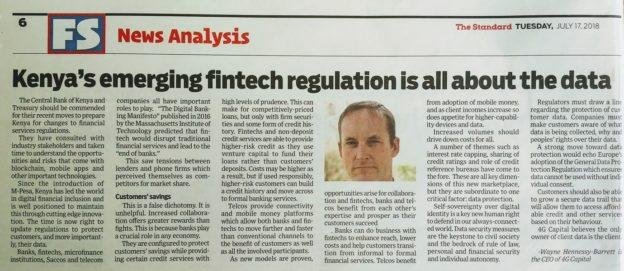“The Digital Banking Manifesto“, published in 2016 by the Massachusetts Institute of Technology (MIT), predicted fintech would disrupt traditional financial services and lead to the “end of banks.” This zero-sum attitude recalls earlier tensions between banks and phone companies which perceived themselves as competitors for market share. This is a false dichotomy and an unhelpful one. Increased collaboration offers greater rewards than pivots away from much-needed core services. Here’s why:
- Banks play a crucial role in any economy. They are configured to protect customers’ savings while providing certain credit services with appropriately high levels of prudence. This can make for competitively-priced loans, but only with firm securities and some form of credit history.
- FinTechs and non-deposit credit services are able to provide higher-risk credit as they generally use venture capital to fund their loans rather than customers’ deposits. Costs may be higher as a result, but if used responsibly, higher-risk customers can build a credit history and move across to formal banking services.
- Telcos provide connectivity and mobile money platforms which allow both banks and FinTechs to move farther and faster than conventional channels to the benefit of customers as well as all the involved participants.
As new models are proven, opportunities arise for collaboration as FinTechs, banks, and telcos benefit from each other’s expertise and prosper as their customers succeed. Banks can do business with FinTechs to enhance reach, lower capital costs and help customers transition from informal to formal financial services. Telcos benefit from the increased adoption of mobile money, and as client incomes increase, so does the appetite for higher-capability devices and data. Increased volumes should drive down costs for all.
A number of themes, such as interest rate capping, sharing of credit ratings and the role of credit reference bureaux, have all come to the fore. These are all important dimensions of this new marketplace, but they are subordinate to one critical factor: data protection.
Self-sovereignty over digital identity is the most important new human right to defend in our always-connected world.
Data security measures are the keystone to civil society in the 21st century and the bedrock of the rule of law, personal and financial security and individual autonomy. Our virtual selves are as crucial to our future as our physical lives.
Our Regulators must draw a line regarding the protection of customer data.
These issues manifest in specific ways; are customers fully aware of intrusive “phone-scraping” of messages and transactions? Where does this data go? How is it protected? Companies must make customers aware of what data is being collected, why, and people’s rights over their data.
A strong Kenyan move toward data protection would echo Europe’s adoption of the General Data Protection Regulation (GDPR)
A comprehensive and achievable framework which ensures data cannot be used without individual consent. Customers should be able to grow a secure data trail that will allow them to access affordable credit and other services based on their behaviour. They should not be excluded on the grounds of property ownership, formal employment records or other criteria which exclude otherwise viable small business owners in the vast informal sector.
And a legal framework alone is not enough
All responsible businesses must have a voluntary focus on exemplary market conduct and client-centricity. We have a duty to our customers, both in serving them and in encouraging responsible citizenship in Kenya. We must work in an eye-to-eye partnership where together we succeed, and the rights and obligations of all are approached in a spirit of fairness. This spirit of partnership must also support our Regulators in showcasing Kenya as the pace-setter, whether in client-centric product design, customer data protection or the responsible application of the latest technologies.
ABOUT: 4G Capital has supported entrepreneurs across Kenya since 2013 with business credit and essential financial training to help them grow sustainably. 4G Capital believes the only owner of client data is the client. It is leading the way in Africa, adopting GDPR measures and working closely with the Centre for Financial Inclusion’s Fintech Protects” community to establish new industry norms in this arena.
This article was originally published on Linkedin and attributed to Wayne Hennessy-Barrett







